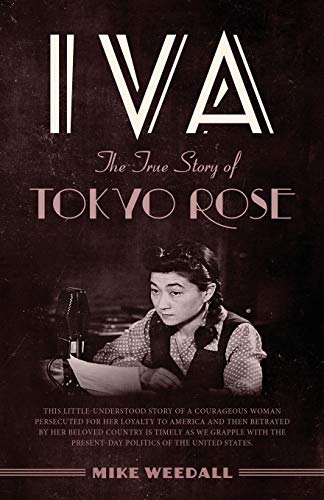Iva: The True Story of Tokyo Rose
Weedall’s debut tells the unforgettable story of Iva Toguri, a young Japanese-American woman who, after World War II, was tried for treason as the so-called Tokyo Rose. Toguri’s prosecution is now regarded as a travesty, motivated by post-war anti-Japanese sentiment rather than justice, and Weedall emphasizes the parallels with anti-immigration rhetoric today.
The novel begins with U.S.-born, college-educated Iva dismayed by Japanese culture and anti-American feeling when she arrives in Japan to visit family. Stranded in Tokyo when war is declared and denied a ration card because she’s not Japanese, Iva finds work at Radio Tokyo, where managers want English-speaking announcers to broadcast propaganda to Allied troops in the Pacific. Though Iva essentially reads prepared scripts and there are several female announcers the troops call “Tokyo Rose,” when the war ends Iva is investigated and imprisoned in Japan, then extradited to the U.S. The novel then follows Iva through her 1949 treason trial, prison sentence, and subsequent struggle for exoneration, which came only when outgoing President Ford pardoned her in 1976.
While Weedall faithfully follows the outlines of Iva’s story, the characters are only broadly sketched. Weedall’s Iva is naïve, brash, easily manipulated, and more stubborn than clever, at odds with the woman of the historical record, a nimble survivor who planted sly digs in her broadcasts and smuggled scarce food supplies to Allied POWs. The book’s tactic of explaining Iva’s feelings through expository thoughts tends to flatten rather than develop the character. The treason trial is gripping as defense attorney Wayne Collins steals each scene, but the motivations for the U.S. government’s aggressive pursuit and Iva’s unwavering loyalty deserve a more nuanced exploration. As a depiction of the costs of injustice and the deprivations of war, the novel is convincing and heartfelt. Readers will be moved by Iva’s fate.










